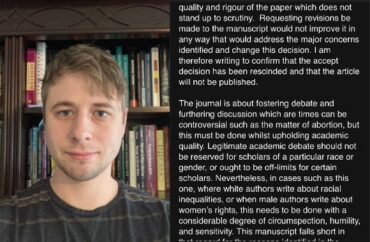
Editor says article on ethics of abortion ‘falls short,’ insensitive
An academic journal has reversed course and rejected an article about abortion that it initially accepted, citing concerns about the author being a “white” “male,” according to an email from the editor obtained by The College Fix.
The article “Abortion Restrictions are Good for Black Women” by philosopher Perry Hendricks initially was accepted for publication earlier this year in The New Bioethics. However, the journal’s editors put it on hold after an abstract received criticism on social media.
Now, Hendricks told The Fix the journal has rejected it.
Editor Matthew James told Hendricks in a May 23 email that the journal rescinded its decision to publish his piece after a second peer review process, according to screenshots of the email Hendricks shared with The Fix.
Due to a publisher’s technical error, James told Hendricks he did not read the article before it was accepted, as is the standard process. He apologized on behalf of the publisher.
After reviewing the paper, James wrote he has “significant concerns” about its “academic quality and rigour” that revisions could not fix.
James also brought up concerns about “sensitivity” and mentioned Hendricks’ race and sex.
“The journal is about fostering debate and furthering discussion which at times can be controversial such as the matter of abortion, but this must be done whilst upholding quality,” James wrote.
“In cases such as this one, where white authors write about racial inequalities, or when male authors write about women’s rights, this needs to be done with a considerable degree of circumspection, humility, and sensitivity. This manuscript falls short in that regard,” the editor continued.
Publisher’s guidelines prohibit consideration of author’s race, sex
Hendricks told The Fix in an email Sunday the journal’s rationale conflicts with its own editorial guidelines.
The editorial guidelines for Taylor and Francis Insights, which publishes the journal, state the sex and race of an author should not be a consideration in judging articles.
“Journal editors should give unbiased consideration to each manuscript submitted for publication,” the guidelines state. “They should judge each on its merits, without regard to race, religion, nationality, sex, seniority, or institutional affiliation of the author.”
Hendricks told The Fix: “It’s a little embarrassing to have to explain this, but whether an argument is sound has nothing to do with the sex and race of the author—this is something any adult knows.”
Taylor and Francis spokesperson Mark Robinson initially responded to The Fix on Tuesday by saying several people were out of the office and asking about the deadline.
The Fix asked if the journal could confirm the email from James to Hendricks, and asked how the rejection of the article on the grounds that Hendricks is male and white fit with its guidelines.
Roberson replied Wednesday, “I’m afraid it doesn’t look like I’m going to be able to provide you with a comment at this time but thank you again for giving us the opportunity to do so.”
In a follow-up email, The Fix offered the publication additional time to comment. No response was received.
The journal initially accepted Hendricks’ article on Feb. 12. However, the article was put on hold on Feb. 15 following complaints by a reader on X, The Fix reported.
Professor: Journal let ‘ignorant online mob trump’ peer review
Hendricks, who holds a Ph.D. in philosophy and taught philosophy classes at the University of Minnesota from 2022 to 2023, expressed concerns about the role that social media outrage played in the rejection of his article.
“It’s unfortunate that The New Bioethics would succumb to pressure from unstable and distraught Twitter users,” Hendricks told The Fix. “Academic journals aim to publish research that has been vetted by peer review. But in this case, Twitter-review, not peer review, seems to have been a decisive factor.”
He said: “This whole kerfuffle started because some academics on Twitter were distraught by seeing an article that didn’t align with their views. These academics should seek help: it’s not healthy to become distraught at the prospect of someone disagreeing with you, and it’s indicative of an unfortunate kind of mental fragility.”
Philosophy Professor Brandon Warmke at Bowling Green State University also expressed concerns about the journal’s decision in an email Wednesday to The Fix.
“By rescinding acceptance of Dr. Hendricks’ paper, The New Bioethics, editor Matt James, and Taylor and Francis have made clear, not only that the journal will let an ignorant online mob trump the peer review process, but that its editor will use an author’s race and sex as a reason to reject papers,” Warmke wrote. “This is the behavior of clowns.”
In a post on X on May 23, Warmke described the publisher’s actions as “incredibly irresponsible and juvenile.”
UPDATE: after the journal initially accepted Perry Hendricks’ paper on abortion, the editor of The New Bioethics, Matthew James, has decided to *rescind* the acceptance and reject the paper because people complained online.
His reason?
“when male authors write about women’s… https://t.co/mlIZDRvNex pic.twitter.com/wlyNKNpgtI
— Brandon Warmke (@BrandonWarmke) May 23, 2024
The rejected article, which can be read online through PhilArchive, challenges the view that abortion restrictions harm black women. According to the abstract, Hendricks makes the case that abortion is morally wrong.
“This is because if someone is prevented from performing a morally wrong action, it’s good for her,” he writes. “For example, it’s good for Sarah if she’s prevented from driving home drunk.”
“However, since abortion is morally wrong, it follows that it’s good for women when they are prevented from getting an abortion. And since black women get abortions at disproportionately high rates, abortion restrictions are good in particular for black women. Indeed, this is an example of a positive effect of intersectionality,” the article states.
MORE: Journal faces ‘legal action’ for pulling pro-life papers
IMAGE: Perry Hendricks
Like The College Fix on Facebook / Follow us on Twitter






Please join the conversation about our stories on Facebook, Twitter, Instagram, Reddit, MeWe, Rumble, Gab, Minds and Gettr.